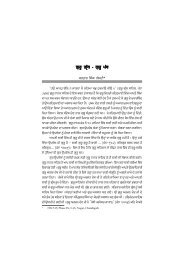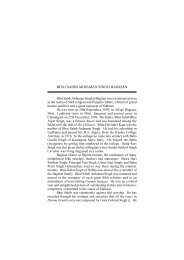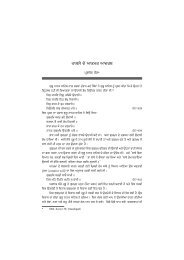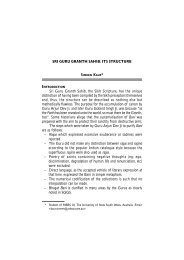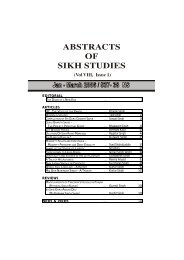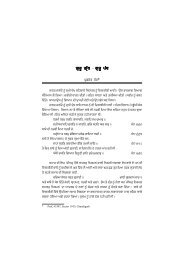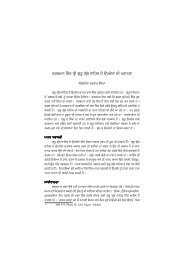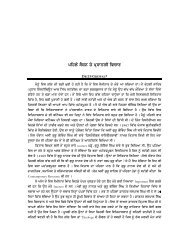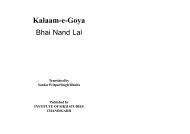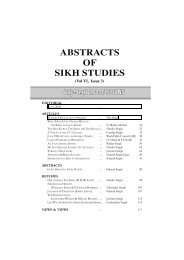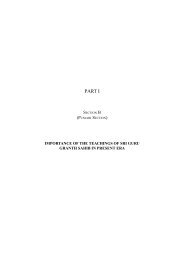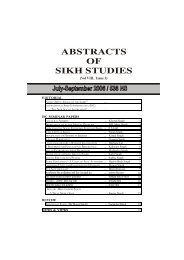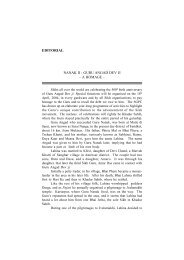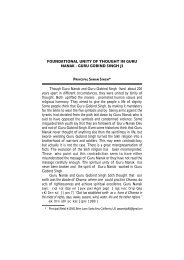editorial articles reviews news & views - Institute of Sikh Studies
editorial articles reviews news & views - Institute of Sikh Studies
editorial articles reviews news & views - Institute of Sikh Studies
Create successful ePaper yourself
Turn your PDF publications into a flip-book with our unique Google optimized e-Paper software.
28<br />
ABSTRACTS OF SIKH STUDIES : APRIL-JUNE 2005 / 537 NS<br />
may then be adopted to prepare translations in other languages.<br />
CONFUSING TRANSLATIONS OF GURBANI<br />
1. i) About two decades ago, during a weekly youth class at the<br />
Punjab Agricultural University campus, Ludhiana, while teaching<br />
Asa di Var, I translated the hymn, jy sau cMdw augvih sUrj cVih hjwr ]<br />
eyqy cwnx hoidAW gur ibnu Gor AMDwr ] p. 463, as “Even when 100 moons and<br />
one thousand suns arise, without a Guru, there will remain pitch darkness”.<br />
A smart student caught my omission. He smiled and asked, “If<br />
2000 suns arise then...”. I immediately realised my mistake and<br />
corrected the statement : “The numbers 100 and 1000 are used<br />
as a phrase and mean 'as many as possible, or innumerable’.<br />
Similarly, the number 100 or any other such number may be used<br />
to lay stress on a point or a fact. For example, once a student<br />
complained to me : w 100 t/oh dcso frnk, pkp{ pmk jh BjhI ;h . I went to<br />
the <strong>of</strong>fice a 100 times, the clerk was not there.” The student had<br />
actually gone there only twice or thrice.<br />
Here this hymn tells that whatever the number <strong>of</strong> suns, without the<br />
presence <strong>of</strong> a guru (the giver <strong>of</strong> gian, spiritual light, knowledge) the<br />
ignorance (darkness) will remain. The couplet lays emphasis on the<br />
need for a Guru for the spiritual enlightenment <strong>of</strong> people. The<br />
translation must bring out this message <strong>of</strong> the hymn. A strictly<br />
literal translation does not always do that. Examples <strong>of</strong> such<br />
mistakes abound in the extant translation.<br />
In the above, the word x'o nzXko refering to ‘total ignorance’ (antonym<br />
<strong>of</strong> gian, knowledge), has been translated literally as ‘pitch darkness’,<br />
‘appalling darkness’ or ‘dismal and dark’. These words fail to convey<br />
the message given by the hymn.<br />
2. A classical literal translation, confusing the reader, may be seen<br />
in the paper, Peeking Back to Move Forward, p. 6, Papers and<br />
Abstracts, the Fourth International Conference 2004 on Guru<br />
Granth Sahib, Guru Nanak Dev University, Amritsar.<br />
PrIdw jy qU Akil lqIPu kwly ilKu n lyK ] AwpnVy igrIvwn mih isru nØIvw<br />
kir dyKu ] (page 1378)<br />
Farid, if you are a master <strong>of</strong> wisdom, then do not keep on writing blackened<br />
essays, Rather, Look underneath your own collar instead.<br />
In this translation the message <strong>of</strong> the hymn is the casualty. First,<br />
the slok is not addressed to Farid, he is the author; secondly, ekb/



